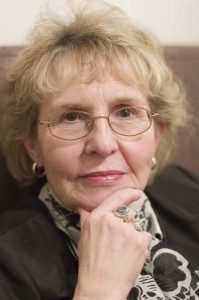 The New York Times recalls her as a post-9/11 public intellectual who served as an “intellectual beacon” and “guiding light for policymakers” during a tumultous political era. The Atlantic describes her as a uniquely non-secularist scholar, whose “greatest legacy” was her “serious intellectual commitment to including God in discussions of politics.” At Crooked Timber, Corey Robin counters the notion that she was a “realist” and criticizes her support for Bush-era policies under the mantle of “just war theory.”
The New York Times recalls her as a post-9/11 public intellectual who served as an “intellectual beacon” and “guiding light for policymakers” during a tumultous political era. The Atlantic describes her as a uniquely non-secularist scholar, whose “greatest legacy” was her “serious intellectual commitment to including God in discussions of politics.” At Crooked Timber, Corey Robin counters the notion that she was a “realist” and criticizes her support for Bush-era policies under the mantle of “just war theory.”
As I sifted through some of the official obituaries, it surprised me how few of them lauded Elshtain for her pioneering work putting gender on the IR security studies agenda. I did not know Elshtain well, and I did not engage with her later corpus as closely as a scholar of humanitarian affairs should have. Yet her writings on gender, war and feminism impacted me greatly as a graduate student – in fact her book Women and War was one of the three that most shifted my thinking in my formative years as a scholar between 1996 and 1999 – the other’s being Tickner’s Gender in International Relations and Enloe’s The Morning After. Elshtain’s thinking on gender later diverged significantly from much of the IR feminist canon, and the normative tenor of her writings on war and peace shifted after 9/11. Nonetheless her progressive impact on IR in opening up a space for security studies scholars to take gender seriously is not doubted by anyone I know of.
Elshtain finished her career at University of Chicago but began it at University of Massachusetts where I now teach. She is remembered here as a brilliant colleague, someone who never forgot her ties to the department. I never knew her well, though when I watched her in action on ISA panels and in conversation with students what struck me was how intellectually refreshing it was to be around someone whose perspective remained fluid and unpredictable. I have very deep respect for scholars who refuse to be put in boxes, who resist specific disciplinary identities. She demonstrated a certain kind of courage it takes to swim against the tide in the academy as in the public sphere. The fact that I disagreed with her on many things did not change my appreciation for the lesson I drew from my our interactions: that the conclusions you draw and the positions you take need not be determined by the opinions of your peers and that ultimately as a scholar you are accountable to your own moral compass, be it driven by an unswerving commitment to your notion of science, your strand of political ethics, or your God.
UPDATE: Please do not miss Christine Sylvester’s piece at The Disorder of Things which speaks beautifully to Elshtain’s legacy as a scholar, mother, mentor, and friend. My favorite line:
Jean was a difficult feminist, one who does not always say what she is supposed to say if she is a real feminist. I disagree with much of her later work, too. But so what? Since when is agreement the measure of a person?
Charli Carpenter is a Professor in the Department of Political Science at the University of Massachusetts-Amherst. She is the author of 'Innocent Women and Children': Gender, Norms and the Protection of Civilians (Ashgate, 2006), Forgetting Children Born of War: Setting the Human Rights
Agenda in Bosnia and Beyond (Columbia, 2010), and ‘Lost’ Causes: Agenda-Setting in Global Issue Networks and the Shaping of Human Security (Cornell, 2014). Her main research interests include national security ethics, the protection of civilians, the laws of war, global agenda-setting, gender and political violence, humanitarian affairs, the role of information technology in human security, and the gap between intentions and outcomes among advocates of human security.

I mentioned ‘Women and War’ on the CT thread attached to C Robin’s post. For a brief post on just war theory prompted by the WaPo obit for Elshtain, see
https://howlatpluto.blogspot.com/2013/08/a-note-on-just-war.html